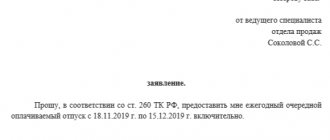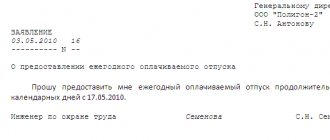20.07.2019
0
61
5 minutes.
The right to periodic leave is one of the key guarantees stipulated in the Labor Code. However, many citizens encounter difficulties, especially when they first try to relax after moving to a new place. To avoid complications associated with this issue, you should familiarize yourself with the legal regulations. In particular, you need to figure out when new employees can take vacation.
Vacation norms of labor legislation
According to Article No. 21 of the Labor Code of the Russian Federation, an employee has the right to his personal rest, which is ensured, among other things, by providing him with guaranteed payment for annual leave. The Russian Labor Code obliges the employer to strictly comply with the regulatory framework in the field of work relations and other legal acts, which contain aspects of basic laws and relevant documents, as well as the terms of collective agreements and agreements. According to Article No. 114 of the Labor Code, employees are provided with annual leave while maintaining their job and their position, and, in addition, their average income. The duration of annual breaks of basic paid leave, which is provided to employees, is twenty-eight calendar days.
So, is vacation after 6 months a right or an obligation? Let's figure it out.
Right to vacation
Paid leave must be granted to the employee every year. That is, a citizen has the right to use such a break in the first year of his work activity with a specific employer. The opportunity to take leave for the first twelve months of work arises for employees after six months of continuous work with a particular employer. And according to the agreement of the parties, leave with subsequent payment is given to the employee even before the expiration of six months. For all employees referred to in Article No. 122 of the Labor Code of the Russian Federation, based on their applications, the employer undertakes to provide leave after 6 months.
After how long does an employee have the right to receive vacation?
In Part 2 of Art. 122 of the Labor Code of the Russian Federation states that absolutely every employee has the right to receive the first leave after finding a job after 6 months of work.
To avoid misunderstandings between subordinates and management and to receive vacation on time, it is recommended to discuss this issue when applying for a job. Or this conversation should take place 2 weeks before the desired start date of the vacation.
Providing leave in proportion to time worked
Labor legislation does not provide for the possibility of providing paid leave every year in proportion to the period of time worked by the employee. The exception is cases when the opportunity to rest is given with the subsequent dismissal of the citizen before the end of the working year for which the leave is granted. In addition, in proportion to the time worked in dangerous or harmful working conditions, additional paid rest periods may be allocated for work performed in such inconveniences. In this case, only periods of time actually worked in harmful and dangerous working conditions are included in the vacation experience.
How many days?
Thus, it turns out that after six months of regular work with a particular employer, the employee who has been granted leave has the right to receive basic paid rest in full, namely for a total duration of twenty-eight calendar days annually. Many people are wondering whether vacation after 6 months is the right or obligation of the employer.
The Labor Code of the Russian Federation does not take into account the possibility of granting partial annual leave in kind with payment, that is, in proportion to the time worked in a particular working year. Based on this, vacation, which is considered regardless of working hours in the year, is provided in full, namely within the established duration.
How long can you take a vacation?
Article 115 of the Labor Code of the Russian Federation states that vacation after six months of work is 28 calendar days. This is the standard period of annual leave that is paid to the employee.
Certain subordinates have the right to take longer leave after employment.
These include:
- persons under the age of majority;
- employees with disabilities;
- people who work with chemical weapons;
- teachers;
- scientific workers.
But how to pay for it?
So, Article No. 122 of the Labor Code of the Russian Federation talks about the annual provision of paid leave after 6 months; the employer has absolutely no reason to pay only for part of such rest, which is fourteen calendar days. In such a situation, the boss undertakes to pay all twenty-eight days that fall during the period of the employee’s annual basic leave with subsequent payment. All calculations for average earnings, which are saved during the rest period, are calculated in accordance with the rules established in Article No. 139 of the Labor Code, in particular the provision of various features in the procedure for calculating the average salary.
Deduction from salary
If an employee quits before the end of the working year, for which he has already been allocated annual paid rest, the employer has the full right to make a deduction from the citizen’s salary, namely, to take away part of the average income issued for unworked rest days. However, such deduction cannot be carried out if the employee is dismissed on the grounds provided for in Articles No. 77, 81 and 83 of the Labor Code of the Russian Federation. What are the nuances of granting leave after 6 months of work?
It is important to note that annual paid leave can be divided into parts, but on the condition that at least one of these sections must be at least fourteen calendar days. Although such a division can only be carried out by agreement between the employer and his employee on the basis of Article No. 125 of the Labor Code. The employer does not have the right to unilaterally divide paid leave annually, or to allocate the employee only fourteen days of this rest.
We understand the issue of whether vacation after 6 months is the right or obligation of the employer.
Dismissal and retention
Difficulties arise when an employee takes time off on vacation to account for the next vacation and decides to quit before the end of the working year, on account of which he was released on vacation. After all, the money paid to him is an advance for his upcoming work in the organization. This means that the organization has every right to withhold this amount from his salary (Article 137 of the Labor Code of the Russian Federation).
There are several exceptions to this rule. You cannot deduct “advance” vacation pay from your salary if the reason for dismissal was:
- reduction of staff of an organization or individual entrepreneur;
- liquidation of an organization or termination of activities by an individual entrepreneur;
- death of an employee or employer - an individual;
- refusal of an employee to transfer to another job for health reasons, confirmed by medical documents, etc.
All these reasons do not depend on the will of the employee; he does not have to repay the debt to the employer if he quits through no fault of his own and not of his own free will.
Please note that when making such deductions, the accountant must be guided by Part 2 of Art. 137 of the Labor Code of the Russian Federation - this is where we talk about deductions for unworked time. It would be a mistake to deduct from wages under Art. 138 of the Labor Code of the Russian Federation, which limits the one-time amount of withholding to within 20% of the payment amount. This article applies only to salaries.
Other provisions for providing paid leave to employees
As already mentioned above, paid rest must be provided to the employee every year, and the right to use such a break for the first twelve months of work appears to the citizen after six months of his regular work with a particular employer.
Leave for the second, as well as subsequent years, can be used at any selected time according to the order of provision of regular paid leave, which is established by a particular employer. Employees who were hired by the institution after the vacation schedule was approved go on vacation not according to its parameters, but according to the corresponding statements. That is, it turns out that after six months of work, the citizen has the right to leave, and the employer has an obligation to provide it if the employee writes a corresponding application.
Let's consider the question of whether there is a right or obligation under the Labor Code to leave after 6 months.
Mutual interests
Along with this, when granting such leave, both participants in the labor relationship - both the employee and his employer - must take into account the mutual interests of each other, and, in addition, the possibility of agreeing on the initial date of rest. The employee, of course, does not have the right to determine the date of going on vacation independently, or to go on it without permission. Exceptions include some specific categories of citizens who can take leave without taking into account the opinion of their employer, for example, employees who are under eighteen years of age and so on.
Is it a right or an obligation for an employee to take leave after 6 months?
Thus, it should be concluded that, of course, a full-time employee has the full right to receive leave upon expiration of six months of work with a particular employer. In addition, if a citizen turns to the employer with an application to provide him with time to rest, then the management does not have the right to refuse him this.
In the event that the allocation of vacation, in the opinion of the management, may adversely affect the normal and successful course of the institution’s activities, then the employer can only in the form of a proposal ask his full-time employee to transfer the vacation to another more suitable period of time, while explaining to the citizen the current situation at the enterprise unfavorable situation. But, if the employee does not want to agree to such a transfer, then the employer simply does not have the right not to let him go on the desired vacation.
All reasons for postponing vacation on the initiative of the employee or management - who will not have their vacation postponed?
In accordance with Article 124 of the Labor Code of the Russian Federation, the following grounds are provided for postponing the vacation period:
- Availability of a certificate of incapacity for work . An employee can apply for it due to illness. While on sick leave, an employee can transfer the vacation time to another time or use part of it and transfer the rest of the period.
- Urgent call to work and unfavorable production conditions of the company. An employee who is on vacation may come to work in exceptional cases and perform his official duties. This can happen, for example, if there is no one to replace him at the enterprise, or a tax or audit is expected. In such circumstances, the employee may request the employer to transfer part of the vacation time.
- Business trip. If there is no one to replace the specialist, the employer has the right to call him to work and send him on a business trip. Of course, the trip must be supported by documentation in order to reschedule the vacation or part of it to another time.
- Failure to comply with notification deadlines. Before an employee is sent on vacation, he must be notified of this - no later than 2 weeks. If he was informed about this earlier, for example, a week in advance, he can ask to reschedule his vacation.
- Fulfillment of government duties. Civil servants who are on vacation and working during it can transfer their vacation time to another period.
- Violation of the procedure for payment of compensation . If an employee does not receive compensation for the required vacation on time, he can arrange for its transfer and refuse compensation.
- Other circumstances that may cause irreparable harm to the enterprise . An employee can be called to work, but only with his consent.
An employee always has the right to refuse to reschedule or urgently return to work unless there are compelling reasons.
The right to annual leave for a new employee, as well as its provision earlier than six months
In standard situations, workers have the right to the first annual rest after six months of continuous work from the moment of official employment at a new enterprise. By mutual agreement of the employer and his employee, the first annual rest may be granted before the citizen completes the required length of service for six months, as stated in Articles No. 122 and 177 of the Labor Code of the Russian Federation.
How many days of vacation after 6 months is an employee entitled to according to the Labor Code?
Is it possible to go on vacation before 6 months?
According to Article 122 of the Labor Code of the Russian Federation, the first annual leave can be taken before the employee has worked for the required period of 6 months. This case requires consent from management.
There are cases when a citizen receives leave ahead of schedule, so to speak, in advance, but then immediately quits. Such a case gives the boss the right to withhold from the subordinate’s salary the amount that was not worked for leave granted ahead of schedule.
Watch the video. Vacations. Procedure for submission and registration:
Exceptions to the rules
The employer is obliged to provide leave before the end of the six-month period at the request of its employee only in exceptional situations in relation to certain categories of citizens, namely:
- employees who have not yet turned eighteen years of age;
- women who are on the verge of immediate leave due to pregnancy and childbirth and after them, including, and, in addition, upon completion of the required period of child care;
- employees who adopted infants under three months of age;
- husbands while their spouses are on leave due to pregnancy and childbirth;
- veterans;
- Chernobyl victims;
- wives of military personnel;
- part-time workers
Can an employer provide vacation to an employee who has not worked for 6 months?
Article 122 of the Labor Code of the Russian Federation, hereinafter abbreviated as Labor Code, establishes that:
Paid leave must be provided to the employee annually.
The right to use vacation for the first year of work arises for the employee after six months of continuous work with this employer. By agreement of the parties, paid leave may be granted to the employee before the expiration of six months.
Before the expiration of six months of continuous work, paid leave at the request of the employee must be granted:
- for women - before maternity leave or immediately after it;
- workers under eighteen years of age;
- employees who have adopted a child (children) under the age of three months;
— in other cases provided for by federal laws.
Leave for the second and subsequent years of work can be granted at any time of the working year in accordance with the order of provision of annual paid leave established by a given employer.
Article 123 of the Labor Code establishes that:
The order of provision of paid vacations is determined annually in accordance with the vacation schedule approved by the employer, taking into account the opinion of the elected body of the primary trade union organization no later than two weeks before the start of the calendar year in the manner established by Article 372 of this Code for the adoption of local regulations.
The vacation schedule is mandatory for both the employer and the employee.
The employee must be notified of the start time of the vacation by signature no later than two weeks before it begins.
(as amended by Federal Law No. 90-FZ of June 30, 2006)
Certain categories of employees, in cases provided for by this Code and other federal laws, are granted annual paid leave at their request at a time convenient for them. At the request of the husband, he is granted annual leave while his wife is on maternity leave, regardless of the time of his continuous work with this employer.
Also, Article 128 of the Labor Code establishes that for family reasons and other valid reasons, an employee, upon his written application, may be granted leave without pay, the duration of which is determined by agreement between the employee and the employer.
The employer MUST, based on a written application from the employee, provide leave without pay to:
- participants of the Great Patriotic War - up to 35 calendar days a year;
- working old-age pensioners (by age) - up to 14 calendar days per year;
- parents and wives (husbands) of military personnel who died or died as a result of injury, concussion or injury received during the performance of military service duties, or as a result of an illness associated with military service - up to 14 calendar days a year;
— working disabled people — up to 60 calendar days a year;
- employees in cases of the birth of a child, marriage registration, death of close relatives - up to five calendar days;
- in other cases provided for by this Code, other federal laws or a collective agreement.
Clause 5 of part one of Article 14 of the Law of the Russian Federation of May 15, 1991 No. 1244-1 “On SOCIAL PROTECTION OF CITIZENS EXPOSED TO IMPACT
RADIATION DUE TO THE DISASTER AT THE CHERNOBYL NPP” it is established that citizens exposed to radiation as a result of the Chernobyl disaster have the right to use regular annual paid leave at a time convenient for them, as well as receive additional paid leave of 14 calendar days.
Therefore, an employee can exercise this right without having worked for 6 months for the employer.
Yuri, if you wish, I can email you. send by mail this Law and other important regulations that regulate the rights of citizens exposed to radiation as a result of the Chernobyl disaster. Maybe you will find something useful in them for yourself.
All the best to you and good health.
Transfer of an employee to another organization
What happens to the length of service that gives the right to annual leave if a citizen enters work as part of a transfer from another enterprise? In such a situation, the accumulated experience, which would give the right to leave, is not preserved when an employee is transferred from one institution to another. That is, it turns out that citizens will have the opportunity to provide rest only when they have been working in a new specific organization for six months.
The fact is that upon transfer, the employment agreement with the previous enterprise is completely terminated, and at the new place of professional activity a new contract is concluded with the employee, as stated in Article No. 77 of the Labor Code. The direct right to receive a period of rest is granted to the employee only upon completion of six months of his work in the institution that sends him on vacation. How is vacation calculated after 6 months of work? According to the employee's average monthly salary.
Features of providing leave
Is an employer required to provide leave to an employee who has worked for less than six months? According to the legislation of our country, the management of the organization is not obliged to provide it to an employee who has not completed work until six months, even after 3 months. In practice, according to experts, most employers provide unpaid leave until the end of 6 months of work, even to those who have worked several times less than six months.
There are several nuances in which management can send you on vacation earlier than after six months of work. This type of worker includes:
- Workers with flexible work schedules.
- Workers who work in dangerous and harmful conditions at the enterprise.
- Employees of enterprises in the Far North of our country.
- Honored athletes and coaches.
Is it obligatory?
Yes, he is obliged to do so if the employee approaches him with a corresponding application. In general situations, upon completion of six months of work, the employee has a legal right to receive leave, and the employer has a direct obligation to provide it. At the same time, when sending an employee on vacation, both parties are obliged, among other things, to take into account each other’s mutual capabilities and interests, and they should also mutually agree on the start date of the vacation period.
We looked at what vacation after 6 months is - a right or an obligation.
Can an employer refuse to provide leave?
The boss has the right to refuse an employee who has applied to him for leave after a six-month working period if:
- the vacation schedule does not include the time specified in the application;
- the time remaining until the end of the working year exceeds the duration of annual leave.
Despite this, information about planned vacation for a new employee hired this year must be included in the schedule approved by management.









